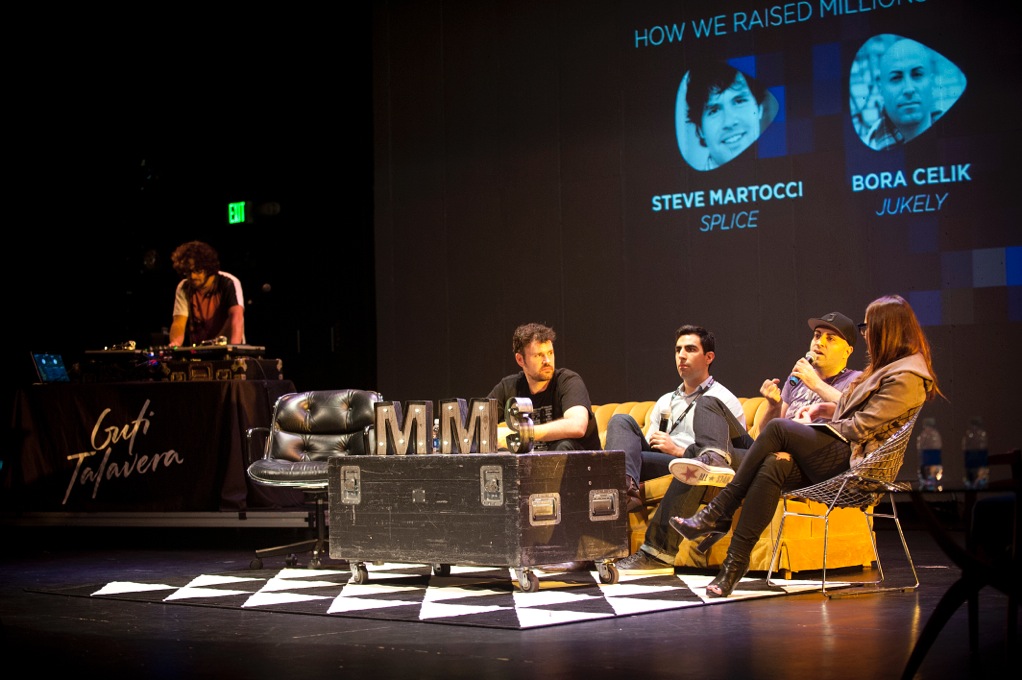
Miami takes on future of tech + music
Panel, 12 Months Later: How We Raised Millions. From left to right: deejay Guti Talavera, Steve Martocci from Splice, Justin Golshir, of JustGo, Bora Celik from Jukely and moderator Lilia Luciano. Photo by Luis Olazabal.
On the same day Miami Beach was celebrating its 100th birthday with major music concert, the Miami Music Summit 2015, a conference bringing together music, technology and entrepreneurship had an eye, and an ear, on South Florida’s next 100 years.
Held with the support of Knight Foundation at Miami Beach’s Colony Theater, the Summit offered hard numbers and eye-opening rags-to-riches stories; long views and specific, how-to-ideas. And there was, of course, live music.
“This event is so important because it brings together people from different disciplines, “said Miami-based music and media producer José Tillán, a multiple Grammy and Latin Grammy winner. “You could be a tech entrepreneur, or you could be an artist and many times you’d be looking for the same thing but in different languages. And It´s important for Miami because this event is a place that unites the local community but also attracts people from the outside world: entrepreneurs, venture capitalists, people in technology and with them, many good ideas.
When you have this mixture of people in a room you can create or explore or discover different possibilities.”
Taking notes and working on code while listening to the presentations, Ben Lavalley attended the conference even though he is not exactly in the music and technology world. A programmer who has been living in Miami for the past seven and half years, Lavalley left a tech company in January to develop his own app, related to the food industry.
“I was impressed to see this veteran techno deejay John Acquaviva [a panelist in the Startup Investment discussion as a co-founder of Plus Eight Capital Management] taking his idea into the investment world and now being an investor himself, “ said Lavalley. “I have a little more runway left before I look for investors. I want to be in a position in which I have some traction in the market before asking for money to go to the next level.”
The agenda included Big Data discussions (“State of the Music Industry” by Liv Buli of the music analytics company Next Big Sound and “Music and Algorithms” by Oscar Celma of the music recommendation service Pandora) and individual stories, such as the ones shared by singer songwriter Raquel Sofia, who also performed live, and musicians and entrepreneurs Nicky Jam (aka Nick Rivera Caminero ) and Ryan Leslie, who bookended the event and offered a mix of personal inspirational stories and how-to strategies. (Music was present throughout by on stage turntablist Guti Talavera who, in tribute to Miami, used source music by Miami musicians.)
“I pay all my bills just with YouTube,” said Nicky Jam, who had early success but whose career was sidetracked for 10 years by substance abuse. He revived it in Colombia, from where he was speaking. He has two songs in the Billboard Top 10, 926 million YouTube views, more than 10 million Facebook followers and 2.5 million Instagram followers. He only recently signed again with a major label. “My advice is to create your own platform where you can be you. I created my own record company in the Net: my YouTube channel, my Instagram, Facebook and my Twitter. As soon as I saw Instagram my life changed.”
There were also startup showcases, featuring presentations of services and technologies as disparate as Dubset, which deals with issues of rights-holder identification, licensing and distribution of music; Bandhub, an online place for virtual music collaborations between recreational musicians; WeDemand, a site in which fans gather virtually to influence a favorite artist’s touring and appearances; and Muzik, a maker of smart headphones and a Miami high-tech success story .
There were also panels focusing on the business end such as “Startup Investing – What does the future hold?” and “12 Months Later – How We Raised Millions and Disrupted the Music Industry,” which included often sobering insights about the startup life. “The pressure only changes from stage to stage, but it never goes away,” said Steve Martocci of Splice.
Meanwhile deejay and investor John Acquaviva noted that “the music business went from analog dollars to digital pennies… and now I see a trickle of digital nickels and dimes so there are a lot of opportunities. That said, most funds like to see a great markup … and some ideas just don’t have a lot of upside. Not all business should be seeking funds by people seeking high growth.”
As for the realistic possibility of establishing Miami as a music-technology-entrepreneurship hub, Katerina Markov Schneider, a venture partner in the Los Angeles-based investment fund AF Square, a venture division of Atom Factory, noted that it’s easier for companies with access to capital nearby, in addition to top talent in engineering and marketing.
Lavalley, the Miami-based entrepreneur working on an app, says he “could’ve gone anywhere to try this. And still, if the right person says we’ll invest in you but we need to do this in Juno, Alaska, I’d do it. That said, I don’t see a reason why it can’t happen here. There are the demographics and enough of a market in Miami to make this happen here. And in the past four, five years it really seems there is something growing that wasn’t here at all before. Is there enough talent here? Is there enough support? I’m looking to be one of the people to find out.”
Fernando González is a South Florida-based arts and culture writer.
Recent Content
-
Communitiesarticle ·
-
Communitiesarticle ·
-
Communitiesarticle ·


